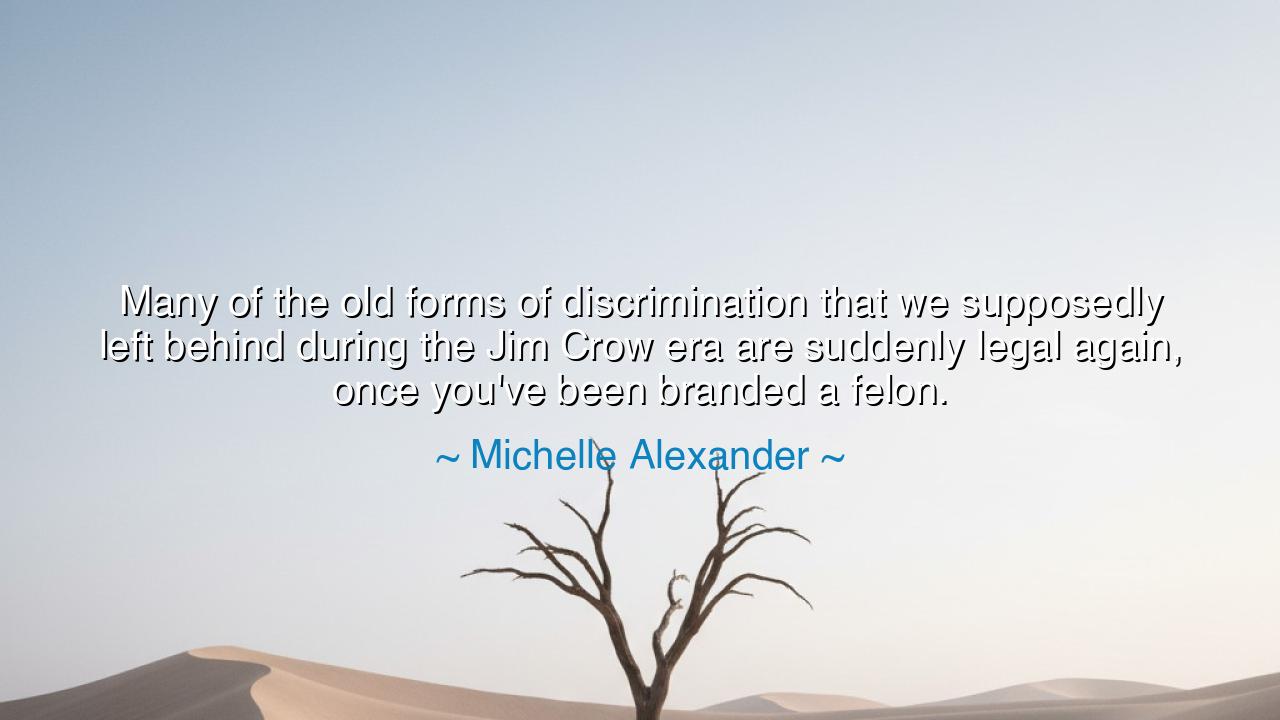
Many of the old forms of discrimination that we supposedly left
Many of the old forms of discrimination that we supposedly left behind during the Jim Crow era are suddenly legal again, once you've been branded a felon.






“Many of the old forms of discrimination that we supposedly left behind during the Jim Crow era are suddenly legal again, once you’ve been branded a felon.” Thus spoke Michelle Alexander, the modern prophet of justice, whose words pierce through the comforting illusions of progress. In her voice we hear the echo of generations who fought for freedom only to find new chains forged in the shadows of the law. Her declaration is not merely an observation, but a warning — that oppression does not always die; it evolves, shedding its old names and disguising itself in new forms. What was once Jim Crow — open, brutal, and visible — now hides behind the cold machinery of mass incarceration and the label of “felon.”
In the days of Jim Crow, the walls of injustice were written plainly in law: separate schools, separate fountains, separate lives. Those statutes have fallen, and many rejoiced to see them crumble. Yet Alexander reminds us that the spirit of exclusion still lingers. The man who has served his sentence may walk free, yet finds himself bound still — denied housing, employment, education, and even the sacred right to vote. These are the same doors once locked by racial segregation, now closed again by a different key: the mark of a criminal record. Thus, the old discrimination, reborn and robed in legality, continues its ancient work beneath the guise of justice.
Her words arise from the truth she revealed in her great work, The New Jim Crow, wherein she traced the path from slavery to segregation, and from segregation to mass incarceration. She saw that when the whip was outlawed and the chain abolished, a new instrument appeared — the prison, vast and unyielding. In it, millions — disproportionately Black and Brown — have been confined, branded, and exiled from the promise of equality. The law, which should liberate, was twisted once more to control. This is the heart of her lament: that legality can coexist with injustice, and that society may call itself fair while perpetuating the same old hierarchies through subtler means.
Consider the story of Jarvious Cotton, whom Alexander herself once described — a man unable to vote, like his father, grandfather, and great-grandfather before him. Each generation was blocked by a different form of oppression: slavery, poll taxes, literacy tests, and now, felon disenfranchisement. The instruments changed, but the result endured. Cotton’s life becomes a living testament to Alexander’s truth: that when society refuses to confront the roots of inequality, history repeats itself — not in form, but in function.
There is in this quote a deeper sorrow — and a deeper call. For Alexander does not merely indict the system; she calls upon the conscience of the people. She asks: What is freedom, if it can be lost through punishment? What is justice, if it leaves no path to redemption? In the ancient days, even the harshest laws of men were tempered by the notion of restoration — that one who had fallen might rise again. But modern society, in its hunger for punishment, has forgotten mercy. The branded felon becomes an untouchable, a citizen in name but a stranger in rights. The law, once the guardian of liberty, becomes its betrayer.
Her words also remind us of the ancient wisdom that law without compassion is tyranny, and that a civilization cannot claim righteousness while casting out its wounded. To deny forgiveness is to deny humanity itself. The ancients understood this truth: in the laws of Solon and Hammurabi, there were paths for the debtor to regain his honor, for the exiled to return. Yet our modern age, proud of its progress, builds ever-higher walls and ever-longer sentences. We boast of justice, but our hearts remain unmoved.
The lesson, then, is clear: to heal a nation, one must restore not only the broken laws, but the broken lives. We must see through the disguises of oppression — whether they wear the robes of Jim Crow or the uniform of modern legality. Let not the word “criminal” blind us to the human being beneath it. The true measure of justice is not how harshly we punish, but how deeply we redeem. To rebuild trust, we must replace stigma with opportunity, and fear with understanding.
So remember, O listener, the wisdom of Michelle Alexander. She calls us not merely to reform policy, but to awaken the soul of the Republic. The chains of old have changed their form, but not their purpose — unless we, the living, choose to break them once and for all. Let every law be weighed not by its words, but by its effects on the least among us. For when we restore the fallen, we restore ourselves. And when justice and mercy walk hand in hand, then, and only then, will freedom truly be whole.






AAdministratorAdministrator
Welcome, honored guests. Please leave a comment, we will respond soon